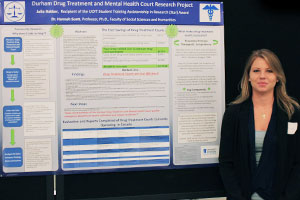FSSH student investigates cost-effectiveness of drug treatment courts
November 5, 2014

Fourth-year University of Ontario Institute of Technology (UOIT) Criminology and Justice student Julia Bakker has helped make a case for drug treatment courts (DTCs) as a cost-effective alternative to traditional court practices.
Bakker spent the summer working with Dr. Hannah Scott, Professor, Faculty of Social Science and Humanities (FSSH), on the Durham Drug Treatment and Mental Health Court (DDTMHC) Project. She conducted a literature review to determine the cost effectiveness of DTCs, specialized courts that only address substance-abusing offenders.
DTCs offer an alternative to traditional criminal-justice measures in addressing drug-addicted offenders. They focus on collaborative solutions between the criminal justice system and drug-treatment providers to reduce the revolving-door lifestyle of addiction, criminal behaviour and jail time through effective rehabilitation.
According to literature coming out of the U.S., DTCs cost about 30 per cent more to operate than traditional courts. However, some studies have suggested DTCs may help save money in other areas, such as health-care services. Not only are clients less likely to use the court system post-treatment, but they are also less apt to use hospital emergency facilities, which have a high service cost.
Through her research, Bakker discovered that:
- For every dollar invested in DTCs, the economic benefits ranged from $2 to $27.
- DTCs help reduce the likelihood of repeat offences by at least 12 per cent.
“I gained real-world insight into the key components and operations of the DDTMHC by sitting in on pre-court meetings with drug court staff, as well as observing the court process on a weekly basis,” Bakker said. “I acquired an understanding of the steps required to complete a research project in the community, and learned about the many challenges that exist along the way.”
Bakker’s passion for drug court research has led her to continue working under Dr. Scott’s supervision this semester. She hopes to conduct further research on the topic in graduate school.
“I am truly pleased with Julia’s work,” said Dr. Scott. “Her literature review helped lay some of the ground work for a much larger project I am working on. What was most valuable is that she received a solid, practical application of how research is done in our community. It may look easy, but it is a lot of hard work.”
Bakker participated in the project as a recipient of the 2014 UOIT Student Training Assistantships in Research (STAR) award, one of the Undergraduate Research Awards offered by UOIT,
“The URA program has broadened my knowledge base within the social science and humanities field,” she said. “It has helped me develop the skills I need to complete more advanced methods of research.”
Her project also took the spotlight at the recent Undergraduate Student Research Showcase, earning her the Best Poster Award for FSSH.


